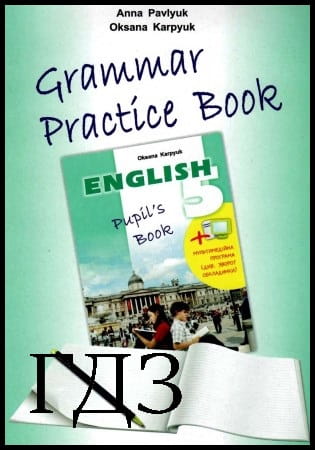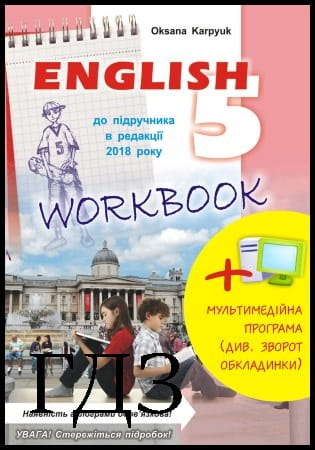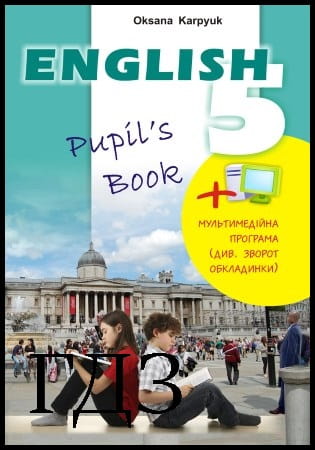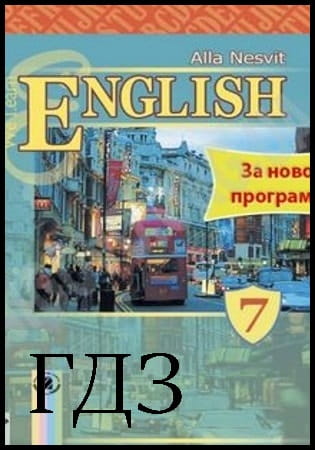ГДЗ Англійська мова 9 клас. Робочий зошит [Карпюк О.Д.] 2017
Unit 3.
Lesson 1. Inventions and Discoveries
1 Match the words on the left with the words on the right to get some important inventions and discoveries of the 20th & 21 st century.| 1 the television 2 the personal 3 the washing 4 heart 5 the atomic 6 the mobile 7 the space 8 the personal | 2 stereo 3 machine 4 transplant 1 set 7 shuttle 8 computer 6 phone 5 bomb |
1. Because Icarus flew very close to the sun.
2. he was born in Italy, but lived and died in France..
9. The Wright brothers made their first flight in 1903.
6. The first flight lasted 59 seconds over a distance of 852 feet.
11. He just forgot the words of his father.
12. He kept the Minotaur at the Labyrinth.
3 Fill in the gaps with the past tense of the verbs in brackets.
BELIEVE OR NOT?
Lawrence Richard Walters was an American adventurer who lived in California. He wanted to become a pilot but was turned
down because of his poor eyesight.
One day he saw a picture of weather balloons in the newspapers and got an idea. He went to the shop, bought 45 weather balloons and several tanks of helium. He took a garden chair, tied the balloons to it and filled the balloons with helium. He made sandwiches and took an airgun because he had planned to land the chair by shooting the balloons one by one. But things went terribly wrong. When his friends cut the string which had tied his chair to the jeep, his chair rised much higher than he had originally planned. He reached the height of almost 3 miles. He was afraid to shoot the balloons, so he went on drifting towards the corridor of Long Beach airport. One of the pilots saw him and reported to the traffic control that there was a man floating in a garden chair with an airgun in his hand above the airport. The traffic controller don't believe it at first but when he heard the same message from another pilot he decided to take action.
In the meantime, Lawrence's balloons got caught in a power line which caused a blackout in a Long Beach neighbourhood.
He climbed down safely, and as soon as he hit the ground he was arrested.
When asked by a reporter why he had done it, he said, "A man can't just sit around!"
4 Fill in the gaps with the missing verbs in the past tense.
1 The brothers Montgolfier flew in a hot-air balloon.
2 People first ate pizza in a pizza shop in 1830.
3 People first wore glasses in 1448.
4 The Wright brothers flipped a coin to decide who would fly first.
5 In the 19th century people travelled to America by steamship.
6 The first mobile phone weighted a kilo.
6 Circle the correct form.
1 People flew / didn't fly before 1903.
2 Sir Thomas Flower invented / didn't invent the computer after 1936.
3 People ate / didn't eat pizza a thousand years ago.
4 People read / didn't read books two hundred years ago.
5 People wore / didn't wear glasses before 1300.
6 People watched / didn't watch movies after 1880.
7 Bell invented / didn't invent the telephone in 1876.
8 Edison made/ didn't make the electric light bulb in 1850.
7 Write what life was like without the following.
1 Before electricity, people used candles, kerosene lamps and burned the fires.
2 When people didn't have television, they read books and newspapers, listened to the radio.
3 Before they had computers, people went to the libraries, read books and spent more time together.
4 When people didn't have mobile phones, they wrote letters and telegrams to each other.
9 Use the verbs from the box and match each invention with their inventors. Wrote the sentences as in the example.
The first flight was made by the Wright.
America was discovered by Columbus.
The first popular car was designed by Karl Benz.
Lego building bricks were created by the Christiansen family in Denmark.
The first walkman and portable disc player was invented by the Japanese company Sony.
10a) Read the questions and circle the correct answer.
1 Who was the first flight in an aeroplane made by?
b) Orville Wright
2 When and where was the first computer developed?
c) in 1948 in Britain
3 Where was the world's first lighthouse built?
a) near Alexandria in Egypt
4 When was the first water closet (toilet) designed?
a) in AD 100 by the Romans
11 Make pairs and then fill in the sentences
1 The first ship which was powered by a steam engine crossed the Atlantic in 1827.
2 Swatch is a fashionable wristwatch from Switzerland made of plastic and often in bright colours.
3 In central heating heat is usually carried through a building by water.
4 In ancient Egypt the Pharaons were buried in pyramids.
5 If you have a Walkman or a portable disc player, you can listen to music wherever you go.
12 Complete the following sentences with the present simple passive of the verbs in brackets.
1 The Science Museum is especially liked by young people.
2 Super fun gadgets and toys are sold at the museum shop.
3 Facts and real-life situations are shown in documentaries.
4 Different types of programmes are broadcasted on television.
5 iPods are used for downloading and listening to music.
6 Many lives are saved by heart transplant surgeries.
13a) Circle the correct form, past simple active or passive.
The atomic bomb (1) was finally constructed in 1945 under the Manhattan project, which (2) was launched by the US Government in 1939 and
supervised by J. Robert Oppenheimer to prevent the Nazis from building such a powerful weapon first. It (3)was detonated in New Mexico in 1945.
13b) Complete the text with the past simple passive of the verbs in brackets.
The first personal stereo was the Walkman, which (1) was made by the Japanese company Sony in 1979, while the iPod is a more popular
version today, especially among teenagers. It (2) was invented by Tony Fadell in early 2001, and it (3) was produced by Apple.
14 Test your memory! How many correct sentences can you make about the important inventions and discoveries you have read about?
- The first car powered by gasoline was designed by Karl Benz in 1885;
- Many remarkable inventions are displayed at the Science Museum;
- The first atomic bomb was constructed by the US military;
- The first personal stereo was called the Walkman;
- Heart transplant surgeries are performed worldwide today;
- The first television set was demonstrated in a department store in London;
- The first electric fridge was designed and built in Sweden;
- iPods are produced by Apple;
- The Internet was established in the USA;
- Personal computers are used by individuals.
15 Complete the text about the compact disc by using the present simple passive or the past simple passive of the verbs in brackets and answer the following questions.
THE COMPACT DISC
A compact disc, or CD, is a disc on which signals (1) are recorded.The signals can be sounds, such as music, video picture signals or information for computers. It (2) is made of aluminium, which (3) is covered with a layer of clear plastic. The signals (4) are cut into the surface and (5) are read by a laser. The compact disk (6) was invented in 1965 by James Russell, but it became popular when it (7) was introduced at first in 1980 and massproduced by the Japanese company Sony and the Dutch company Philips. It all started in the year 1979, when Philips and Sony got together to design a new digital audio disc.This disc (8) was sold soon all over the world, especially Europe and the United States in 1985, and the rest is history. Today it (9) is used for storing high quality recorded sound and large quantities of information.
And, thank god, it (10) is sold at a very low price!
17 Find pairs and then make sentences in the past passive. Use the verbs from the box in this order.
The first flight was made by the Wright Brothers.
America was discovered by Columbus.
The first popular car was designed by Karl Benz.
Lego building bricks were created by the Christiansen family in Denmark.
The first Walkman and portable disc player was invented by the Japanese company Sony.
18 Match the words with their definitions.
1 investigation — serious study of a subject that is intended to discover new facts or test new ideas;
2 research — attempt to find out the reasons for some scientific problem;
3 search — attempt to find a solution to a problem or an explanation for something
4 advance — something that gives you advantages or improves your life in some way
5 benefit — change, discovery or invention that brings progress
6 invention — act of inventing something or a useful machine, tool, instrument, etc that has been invented
7 theory — idea or set of ideas that is intended to explain something about life or the world, especially one that has not yet been proved to be true
8 technology — knowledge about scientific or industrial methods or the use of these methods; machinery and equipment used or developed as a result of this knowledge
19 Choose the correct word a), b), c) or d) to complete the sentences.
1 The robots will be d with radar vision.
2 Scientists need special a to do their research.
3 The b of the tests will be published in a scientific journal.
4 A lot of scientific b is done with robots.
5 A dog can hear sounds that are c to humans.
6 Artificial intelligence programs are c with Rex.
7 The RoboCup Challenge is used to c and improve programmes.
20 Complete the sentences using the words from the box.
Thomas Edison's most famous invention is probably the light-bulb; his favourite though was the phonograph. The phonograph, he said, would replace shorthand typists and it would be used to teach languages. He believed that a phonograph and a clock would actually say what the time was. He thought that people would send phonographic records instead of letters and that they would record thevoices of their children and the last words of the dying. Edison also believed that people would listen to world-famous musicians on phonographs in their own homes. People have largely forgotten Edison's invention, but it was actually an early kind of records or cassette player.
22 Complete sentences using a word that is built from the word in brackets.
1 Einstein was a physicist.
2 He was a peaceful man.
3 His discoveries were far ahead of their time.
4 His original ideas on physics caused a sensation.
5 He was very inteligent.
6 He was a dreamy child.
7 He studied Physics in Switzerland.
8 His theory of relativity surprised many scientist.
9 When he got the Nobel Prize, he became very famous.
10 He left Germany because his life was in dangerous.
11 He was very worried about the use of the atomic bomb.
12 When it was dropped on Hiroshima, he was very sad.
13 He thought science was a powerful instrument.
14 After World War II he continued to work both for science and for peace.
 ГДЗ 9 клас Зошит Робочий зошит 2017 Карпюк Англійська мова Либра Терра
ГДЗ 9 клас Зошит Робочий зошит 2017 Карпюк Англійська мова Либра Терра
 Якщо помітили в тексті помилку, виділіть її та натисніть Ctrl + Enter
Якщо помітили в тексті помилку, виділіть її та натисніть Ctrl + Enter 16.12.2018,
16.12.2018,
 6 559,
6 559,
 0
0
 Назад
Назад




![ГДЗ Природознавство 5 клас. Підручник [Ярошенко О.Г., Бойко В.М.] 2018 ГДЗ Природознавство 5 клас. Підручник [Ярошенко О.Г., Бойко В.М.] 2018](/uploads/posts/2019-04/1555779316_5_p_y_u2018.jpg)
![ГДЗ Основи правознавства 9 клас. Підручник [Наровлянський О. Д.] 2017 ГДЗ Основи правознавства 9 клас. Підручник [Наровлянський О. Д.] 2017](/uploads/posts/2019-02/1550928122_9k_p_n_2017.jpg)
![ГДЗ Українська мова 8 клас. Підручник [Глазова О.П.] 2021 ГДЗ Українська мова 8 клас. Підручник [Глазова О.П.] 2021](/uploads/posts/2021-10/1633720388_8k_y_g_2021.jpg)
![ГДЗ Вступ до історії 5 клас. Підручник [Гісем О.В.] 2018 ГДЗ Вступ до історії 5 клас. Підручник [Гісем О.В.] 2018](/uploads/posts/2019-07/1564163269_5k_i_h_2018.jpg)